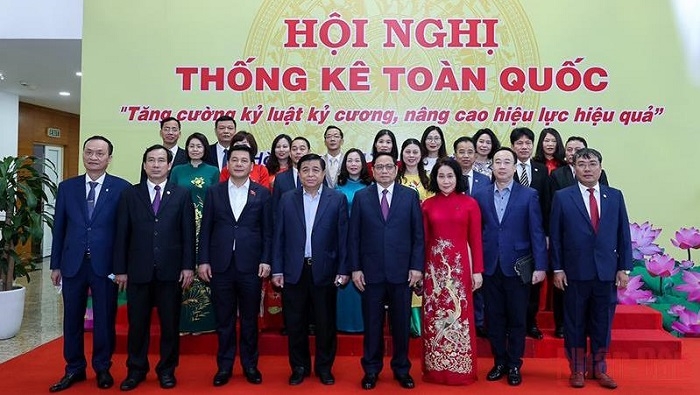Statistical work significant to policy making: PM
ABO/NDO – Prime Minister Pham Minh Chinh emphasised that the statistical work plays a significant role, especially in policy making, while addressing the National Statistical Conference on March 17.
Party, State and Government leaders have paid attention to the work, which must be done in an accurate, timely and transparent manner, the PM stressed, adding that statistics must be analysed and assessed to serve policy making.
The leader attributed achievements Vietnam has recorded in COVID-19 containment and socio-economic recovery and development to contributions of the statistics sector.
 |
| Prime Minister Pham Minh Chinh (front row, fifth from left) and delegates at the conference (Photo: NDO/Tran Hai). |
He commended the sector’s performance in the implementation of the Statistics Law, digital transformation, organisation consolidation, and international cooperation.
Pointing out weaknesses in the field of ministries and agencies, Chinh said they have yet to invest much in the statistical work and bring into full play statistics.
The PM also noted other shortcomings regarding coordination between agencies, human resources and management.
He, therefore, underlined the need to raise the awareness of the statistical work for the entire political system, especially leaders of all-level authorities, and ordered them to improve personnel quality, pour more investment in the statistical sector, step up coordination between ministries and agencies, and enhance international cooperation in this regard.
Foreign participants proposed solutions to help the Vietnamese statistical sector better integrate into the region and the world.
The Statistics Law has been amended thrice and decrees on the implementation of the law issued, creating a legal corridor to conduct statistical activities.
Statistics have been used to review the implementation of the 2011-2020 socio-economic development strategy and the 2016-2020 socio-economic development plan, along with the building of the 2021-2030 socio-economic development strategy and the 2021-2025 socio-economic development plan at both central and grassroots levels.
(Source: NDO)
 về đầu trang
về đầu trang







